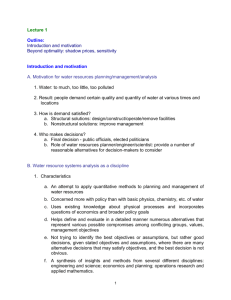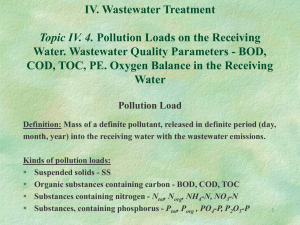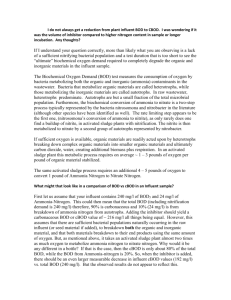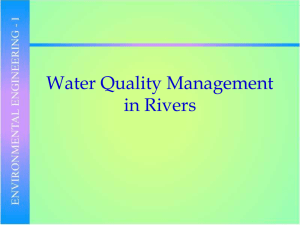Energy Flow in Ecosystems
advertisement
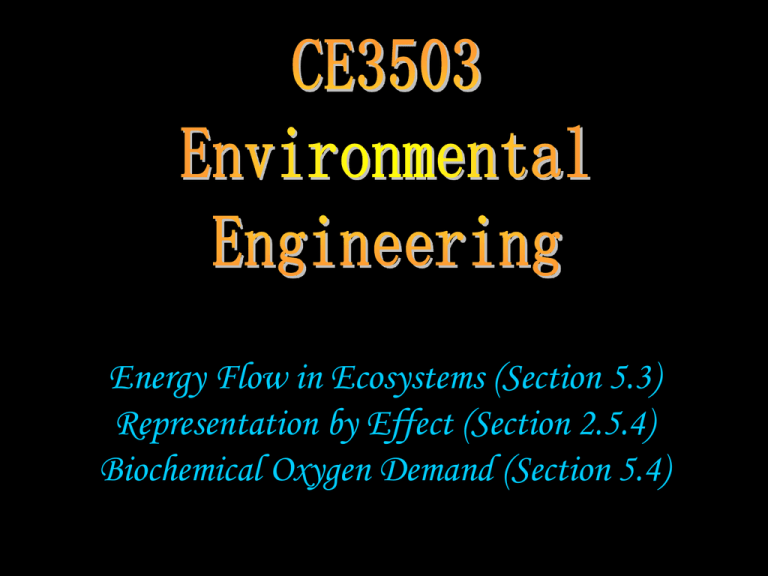
Energy Flow in Ecosystems (Section 5.3) Representation by Effect (Section 2.5.4) Biochemical Oxygen Demand (Section 5.4) Energy Flow in Ecosystems Energy Flow in Ecosystems Energy fixation Organic matter Autotrophs Heterotrophs Aerobic respiration Energy Flow in Ecosystems Anaerobic respiration Nitrate removal Mercury cycling Drinking water Sludge digestion Energy Flow in Ecosystems Biomass Production Autotrophs Primary producers Algae Phytoplankton Heterotrophs Secondary producers Primary Consumers Herbivores Zooplankton Heterotrophs Secondary consumers Planktivores Heterotrophs Tertiary consumers Piscivores Carnivores (also omnivores) Energy Flow in Ecosystems Food chain Food web Energy Flow in Ecosystems Energy Flow in Ecosystems Energy Flow in Ecosystems Microbial loop (sustainable?) Other types of units: representation by effect. Other types of units: representation by effect. Other types of units: representation by effect. Organic Matter. CO2 H2 … what’s in here? Organic Matter. Proteins (polymers of amino acids) Carbohydrates (sugar and the polymers starch and cellulose) CO2 H2 Fats ( Fats (formed from glycerol and fatty acids) Organic Matter. Photosynthesis CO2 H2O C( H2O) O2 Respiration C( H2O) O2 CO2 H2O also …mineralization oxidation stabilization Representation by Effect - Organic Matter. Respiration CO2 H2 C( H2O) O2 CO2 H2O When organic matter is used as a substrate for respiration, … when it is oxidized … when it is mineralized … when it is stabilized it exerts a “biochemical oxygen demand” or BOD. BOD - Representation by Effect. … impacts on lakes and rivers? Biochemical Oxygen Demand BOD: the amount of dissolved oxygen (mg/L) required to oxidize the organic matter in water. CBOD: BOD exerted through oxidation of carbonaceous material. C( H2O) O2 CO2 H 2O NBOD: BOD exerted through oxidation of ammonia. NH4 2HCO3 2O2 NO3 2CO2 3H2O Biochemical Oxygen Demand NBOD is simple stoichiometry, NH4 2HCO3 2O2 NO3 2CO2 3H2O Stoichiometry does not work for CBOD because not all of the organic matter present is biodegradable. C( H2O) O2 CO2 H 2O Thus the CBOD is never greater and almost always less than the theoretical BOD (ThBOD). C6 H12O6 6O2 6CO2 6H2O but for wastewater, not so much! Biochemical Oxygen Demand Concentration L0 dL kL L dt Lt L0 expkL t Distance or TimeTime (yr) Biochemical Oxygen Demand BOD Remaining (L) Lt L0 expkL t BOD Exerted (y) yt L0 Lt yt L0 L0 expkL t yt L0 (1 expkL t ) Biochemical Oxygen Demand BOD Exerted BOD Remaining Biochemical Oxygen Demand 5-day BOD and Ultimate BOD yt L0 1 exp kL t 5-day BOD is a laboratory measurement. Ultimate BOD is for field aplications.

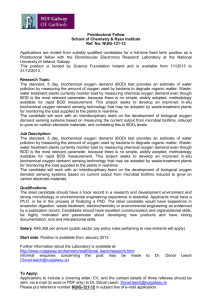

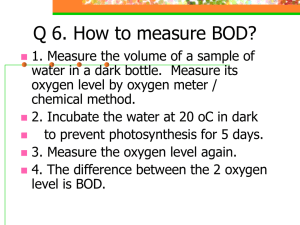
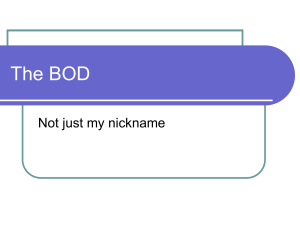
![Crisis Communication[1] - NorthSky Nonprofit Network](http://s2.studylib.net/store/data/005428035_1-f9c5506cadfb4c60d93c8edcbd9d55bf-300x300.png)
